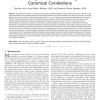Free Online Productivity Tools
i2Speak
i2Symbol
i2OCR
iTex2Img
iWeb2Print
iWeb2Shot
i2Type
iPdf2Split
iPdf2Merge
i2Bopomofo
i2Arabic
i2Style
i2Image
i2PDF
iLatex2Rtf
Sci2ools
PAMI
2007
2007
Discriminative Learning and Recognition of Image Set Classes Using Canonical Correlations
—We address the problem of comparing sets of images for object recognition, where the sets may represent variations in an object’s appearance due to changing camera pose and lighting conditions. Canonical Correlations (also known as principal or canonical angles), which can be thought of as the angles between two d-dimensional subspaces, have recently attracted attention for image set matching. Canonical correlations offer many benefits in accuracy, efficiency, and robustness compared to the two main classical methods: parametric distribution-based and nonparametric sample-based matching of sets. Here, this is first demonstrated experimentally for reasonably sized data sets using existing methods exploiting canonical correlations. Motivated by their proven effectiveness, a novel discriminative learning method over sets is proposed for set classification. Specifically, inspired by classical Linear Discriminant Analysis (LDA), we develop a linear discriminant function that maximizes ...
Related Content
| Added | 27 Dec 2010 |
| Updated | 27 Dec 2010 |
| Type | Journal |
| Year | 2007 |
| Where | PAMI |
| Authors | Tae-Kyun Kim, Josef Kittler, Roberto Cipolla |
Comments (0)

